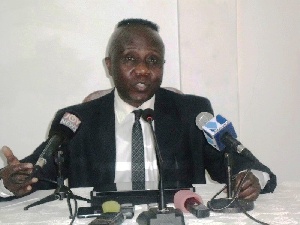A senior economist, has blamed the redenomination of the cedi against the United States dollar embarked upon by the government in 2007, for the current inflation problem the nation is facing.
Dr J. K. Kwakye, Senior Economist of the Institute of Economic Affairs (IEA) said the decision was a political one, and according to him, it was an illusion which should not have been created.
He said trying to make a currency stronger than the dollar by cancelling some zeros was not a good enough, adding that the smallest unit of the dollar (cent) since its creation was still in circulation, whereas that of the new Ghana cedi cannot buy anything.
Dr Kwakye was speaking at a news conference on Tuesday in Accra to present the IEA’s views on the state of the economy and the outlook following the Minister of Finance’s presentation of the 2014 mid-year review of the economy to Parliament.
He said inflation target had been revised upwards by the Minister from 9 per cent to 13 per cent. He said it is unfortunate that the economy seem to be validating high inflation instead of trying to rein it in.
He said the upward revision recognises the reality because inflation in June had reached 15 per cent and achieving the new higher target would still be challenging and would depend on how the driving forces mentioned above fuel and utility price adjustments, cedi depreciation, food inflation, and fiscally-induced demand pressures evolve.
He observed that in order to tame inflation on a durable basis, we need to address these driving forces and, in particular, close the demand-supply gaps in the economy. He said Ghana’s exchange rate is potentially vulnerable to delayed donor disbursements, slowing private capital inflows, still-high import demand, and high inflation.
The Senior Economist said donor support for the country is not coming forth due to government’s inability to adhere to strict public expenditure and to reduce the size of government. He said there could be some temporary respite from expected receipts from the syndicated cocoa loan and bond issue.
Dr Kwakye said the Bank of Ghana (BoG), however, faces the policy dilemma of bolstering its reserves and the cedi. He said the BoG would have to continue to review its regulatory measures so as to boost forex flows into the economy especially via formal channels.
Dr Kwakye said the bottom line is that the cedi’s persisting weakness reflects the economy’s underlying weak structure and weak fundamentals—essentially the weak “colonial structure” and weak fiscal discipline.
He said arresting the cedi decline on a durable basis requires fundamentally transforming the economy by diversifying and adding value to exports, promoting domestic industrialisation in order to reduce import demand, and entrenching fiscal discipline.
He said there is the need for government to reduce borrowing in order to reduce interest costs; and to implement a debt-restructuring strategy to reduce immediate debt-servicing pressures on the budget. The Senior Economist said government must phase out universal subsidies and strengthen social intervention programmes targeted to the poor.
He said universal subsidies only benefits the rich. He urged government to reduce recurrent spending as a whole to create room for higher capital spending in order to boost growth. He said for terms of financing, there is a need to reduce BoG financing in order to reduce its adverse effects on the economy, including inflation and currency depreciation.
Business News of Wednesday, 23 July 2014
Source: GNA

















